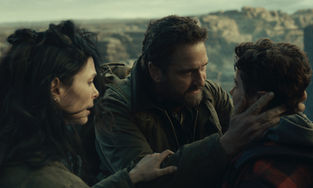'Bodkin' season 1 review: Netflix dark comedy hits the record button at the scene of the true crime
- S.J.

- May 9, 2024
- 4 min read
Updated: Mar 9, 2025

Just when the world needs 'em the most, and because there definitely isn't enough of them already, you hear that a new hero has arrived: an average white guy with a podcast. In the first season of Bodkin, a dark comedy collaborating with mystery elements for commercial reasons, the titular small town in Ireland faces unwanted attention when our main trio—Irish investigative journalist Dove (Siobhán Cullen), American true crime podcaster Gilbert (Will Forte) and British researcher-producer Emmy (Robyn Cara)—show up in order to collaborate on a podcast for commercial reasons.
The ragtag team is there to make a series about old, unsolved disappearances of three locals during Samhain festivities, something that few are willing to talk about since the podcasters soon find out that the situation might involve plenty of secrets and shame. Locals, and therefore possible suspects in the conspiracies, they meet in the area include their personal driver Sean (Chris Walley), bad-tempered Seamus (David Wilmot), police sergeant Power (Denis Conway), crooning introvert Teddy (Ger Kelly) and Catholic nun Bernadette (Fionnula Flanagan).
A big part of Bodkin's success rate depends on the tightrope walk in regards to tone because the mix of dark humour, eccentric side characters and the unfolding of the central mystery either invites you in or it doesn't. Showrunners Jez Scharf and Alex Metcalf alongside the directors (Nash Edgerton, Bronwen Hughes, Johnny Allan and Paddy Breathnach) manage that sense of playfulness fairly decently at first as the show is breezy and moves very well between different perspectives since the main trio aren't necessarily natural-born team players. Brilliant podcasti.. no, wait, casting choices (by casting director Louise Kiely) make the different corners of the town feel properly inviting or even homely since each supporting player, including those mentioned above, is immediately recognisable whilst Cullen, Forte and Cara are all really well-suited for their cynical, desperate and wimpy characters, respectively.
Unfortunately with that outline and tone, Bodkin also draws obvious comparisons to other existing series—many will call it a mix of two successful ones in particular, you'll know if you're aware of what is out there—so it's hard to not be like Dove and become cynical about how the show was developed and shaped. It makes the cracks even more apparent but it's also easy to see that the filmmakers behind the show don't end up finding their own sound or brand, so to speak, during this seven-episode run. When it comes to humour specifically, it's important to find your own way of delivering the material, even if the story or premise is familiar. Instead as it moves along, Bodkin ends up being a hodgepodge of different elements ranging from mediocre to okay, as if the creativity was bogged down by ''It should be x meets y'' and ''The character needs this generic quirk'' types of notes along the way.
Said hodgepodge becomes increasingly larger and untidier when the writers' room (including Paddy Campbell) keeps adding half-assed aspects to the characters, such as Gilbert's wife coming to Ireland, Dove's past haunting her or others' weird relationship with violence, because the series simply doesn't have the time or resources to unpack all of that all the while it wants to be more about the plot. And yes, in the mystery genre you can focus on the plot with twists and turns if you've laid the groundwork with the characters previously. That's just not what happened here. It's almost like Scharf, Metcalf and others were also afraid of not getting future seasons so they tried to throw in too much stuff at once, sacrificing their voice in the process.
The series' confusion about its identity is also noticeable elsewhere. Composer Paul Leonard-Morgan's score filled with dark basslines, garage rock guitars and reverb-heavy plucks understands the playful, idiosyncratic tone that the first episode establishes and it's in a harmonious conversation with the soundtrack choices as well, which range from Irish hip-hop to moody alt-pop and to some beautiful singing by Kelly. Less harmonious is the series' visual palette where greens, blacks and skin tones are pallid and severely affected, partly due to the poor colour grading and partly due to inconsistent lighting (cinematographers include Piers McGrail and Cathal Watters). There's some abnormal shifting going on with the show's key creatives, which perhaps played a part in the overall cohesion or its lack thereof.
Bodkin is not bad or a disaster per se, like it easily could've been, but it should be better and pales in comparison to its competition in the comedy and mystery genres, as if it were just another middling true crime podcast, gently floating in the sea of them. All the actors and a few visual gags are bright spots, but at some point, you just need to stop following others' footsteps and assess where you might want to diverge from the path.
Smileys: Casting, score
Frowneys: Originality, characterisation, colouring
This Dove flies like a rock.










